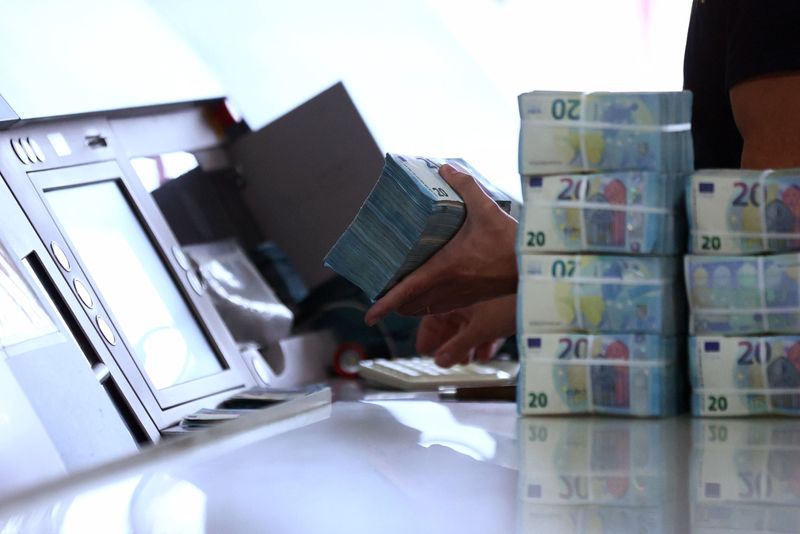

© Reuters. FILE PHOTO: A worker grabs a pack of 20-euro notes at the Bank of Portugal fortified complex in Carregado, Alenquer, Portugal, May 17, 2022. REUTERS/Pedro Nunes
By Samuel Indyk and Stefano Rebaudo
LONDON (Reuters) -Euro zone government bond yields edged up towards September’s multi-year highs on Thursday, with analysts reckoning that the recent bond rally was too early as inflation might still surprise on the upside.
Borrowing costs were roughly unchanged after the release of the European Central Bank minutes. Policymakers meeting last month worried inflation could get stuck at exceptionally high levels, so aggressive policy tightening was needed, even at the cost of weaker growth.
“Although we believe that the Bund bear market should come to an end in 4Q22 with the peak in euro zone HICP inflation, we think that the rally occurred too early and too fast, and we would expect a return above 2.25% with even potentially a new high in yields in October,” Morgan Stanley (NYSE:) analysts said in a research note.
Concerns about a further economic slowdown and potential systemic risks due to the impact of higher rates on heavily indebted countries triggered a fall in euro zone yields since last week.
Money markets are almost fully pricing in another 75 bp interest rate hike in October with around 125 bps of tightening by year-end, according to data from Refinitiv.
By 1154 GMT, the German 10-year yield, the benchmark for the bloc, was up 2 bps at 2.04%. It hit an 11-year high of 2.352% on Wednesday last week.
Italy’s 10-year yield was down 0.5 to 4.44% after rising by 27 bps on Wednesday, its largest daily jump since March 2020.
The rise in Italian yields came after ECB support for the country’s bonds faded during the summer. Bond yields move inversely with prices.
The ECB said holdings of Italian bonds under its Pandemic Emergency Purchase Programme (PEPP) shrank by 1.24 billion euros in August and September.
This followed a 9.76 billion euro increase in the previous two months, when the ECB announced plans to use PEPP reinvestments to prevent bond yields and spreads from rising too far or too fast in the weakest countries.
“While the negative sign can be explained by timing issues over the thinner summer months, the data still reveal that the ECB has not followed up with larger purchases,” Commerzbank (ETR:) rate strategist Hauke Siemssen said in a note.
“The positive interpretation for BTPs is that key spread levels continue to hold without ECB support despite rising yields.”
The yield gap between Italian and German 10-year yields narrowed by 2 bps to around 239 bps on Thursday.
A key market gauge of long-term inflation expectations in the euro zone crept as high as 2.2046% after falling as low as 2.0586% on Monday, its lowest since end-July.
British bonds were underperforming with the 10-year gilt yield up 13 bps to 4.16% after ratings agency Fitch cut the outlook for Britain’s credit rating to “negative” from “stable” following the government’s Sept. 23 fiscal statement. That was the highest level since Sept. 30.